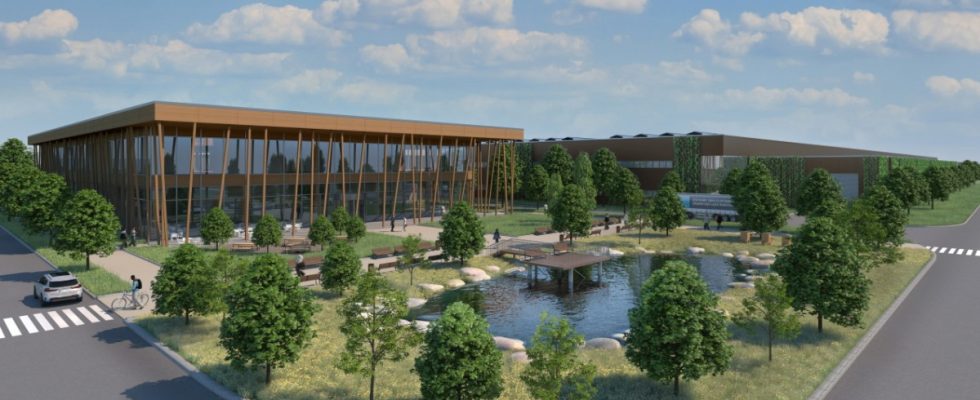When it leaked out at the beginning of the year that the Munich-based car company BMW wanted to build its new high-voltage battery factory to convert its vehicle fleet to e-mobility in Straßkirchen, Lower Bavaria, the otherwise rather cautious Bavarian Minister of Construction Christian Bernreiter (CSU) became enthusiastic. “This is a very strong signal for the entire region,” said Bernreiter, who is at home in Lower Bavaria, “but also for the future viability of the Free State.” At the same time, Bernreiter promised BMW the full support of the state government. Economics Minister Hubert Aiwanger (Free Voters) even rushed over personally from Munich on a Friday evening when BMW presented its plans in Straßkirchen. The new plant would be the most important industrial settlement in Lower Bavaria for decades.
Now Bernreiter sounds much more sober. “Referential decisions are common instruments of Bavarian local politics,” says the building minister, who was district administrator for the Deggendorf district before he was appointed to the cabinet. “Now it is important to promote an important component of Lower Bavaria’s industrial future with secure, high-quality jobs.” Aiwanger goes one step further at a distance. “I’m a big fan of direct democracy. As free voters, we’ve already made a number of referendums,” he said. “It’s living democracy when such a central topic for the community is discussed intensively with the citizens and then voted on.”
The reason for the new reluctance: On Thursday evening, the Straßkirchner municipal council unanimously declared that the citizens’ initiative “Yes to the preservation of fertile soil in the Gäuboden” against the large-scale project is legally permissible. At the same time, the municipal councils decided to oppose the citizens’ petition with a council petition for BMW’s plans. On Sunday, September 24, the approximately 2,800 eligible voters in Straßkirchen are to vote on both requests. This at least makes it conceivable what no politician and probably no manager at BMW could imagine up to now: that the people of Straßkirch will give BMW a basket and reject the settlement plans.
The new battery plant is a central building block in BMW’s strategy for the future. From here, the BMW plants in Munich, Dingolfing and Regensburg will be supplied with high-voltage batteries. At the end of February, the group acquired 105 hectares of arable land for the factory in Straßkirchen and its neighboring community of Irlbach, which had previously been very rural. In a first phase, around 60 hectares are to be built on, and 1,600 employees are to work in the plant. There are expansion scenarios for the remaining 45 hectares, but no decisions have yet been made. At the same time, BMW secured the right of first refusal for a further 36 hectares of farmland. This makes it clear that the battery plant could one day cover an area of 140 hectares.
Lower Bavaria is BMW country
Lower Bavaria is BMW country, the car company says it employs around 20,000 people in its plants there. Around 7,500 employees live within a 20-kilometer radius of Straßkirchen and Irlbach alone. The mayor of Strasskirch, Christian Hirtreiter (CSU), has also liked to emphasize in the past that there is hardly a family in his community without a connection to BMW. For this reason alone, no one in the region expected resistance to the settlement plans.
But there is. From the outset, the citizens’ initiative “Liveable Gäuboden” did not want to accept that valuable farmland would be lost for the project. “The soils here in Gäuboden are among the most fertile in the world,” is the credo of BI spokesman Thomas Spötzl. “We absolutely want them to be preserved.” The surface consumption is not the only reason why Spötzl and his comrades-in-arms are against the large-scale project. They are convinced that the planned factory will completely overwhelm the 3,400-inhabitant town of Straßkirchen – from the influx that is expected, but also from the traffic. The popularity of BI is surprising for many. 474 people from Straßkirch supported the petition with their signature, 280 would have been necessary for the referendum.
Spötzl’s citizens’ initiative attaches great importance to its independence. The Bund Naturschutz (BN) in Bavaria supports them at least ideally. The organization has also positioned itself against the BMW plans from the start. “We are not fundamentally against the battery factory,” says BN boss Richard Mergner. “But we don’t accept that tens of hectares of free landscape will be built over it.” The car company should build the new plant on brownfield sites at existing locations. “In Regensburg alone, BMW has parking spaces of the order of 30 hectares,” says Mergner. At the same time, he sharply criticizes the state government. The reason: The preparatory work for the approval process is already underway. “The Free State has turned the usual procedure upside down,” says Mergner. “I hope that the referendum will be fair.”
The car company is optimistic
And what does BMW say about the fact that its plans could be stopped by the people in Straßkirch? “We fundamentally welcome the fact that our democratic political system provides for the possibility of a referendum,” explains a company spokeswoman. The referendum comes as no surprise. In addition, the request for advice from the Straßkirchner municipal council for the project is welcomed. Otherwise, BMW is optimistic. We will continue to provide information about the project and present the progress in many dialogues with the citizens. “We are already receiving a lot of approval today,” explains the spokeswoman, “we are confident that we can implement our project as planned.”

